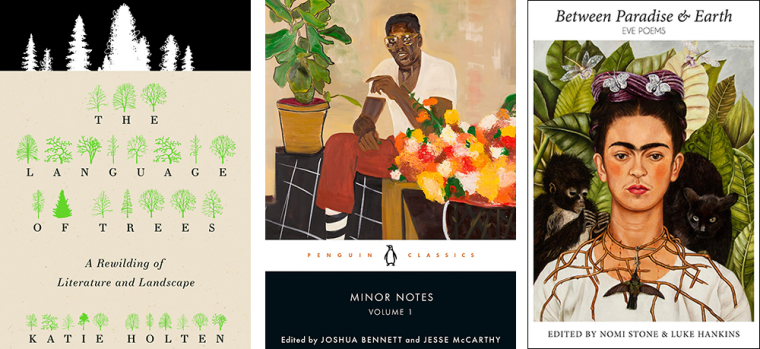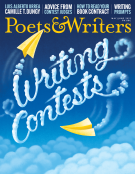Among the many new books published each season is a shelf full of notable anthologies, each one showcasing the work of writers united by genre, form, or theme. The Anthologist highlights a few recently released or forthcoming collections, including Between Paradise and Earth: Eve Poems (Orison Books, April 2023).

Conceived as “a love letter to our vanishing world” by editor Katie Holten, The Language of Trees: A Rewilding of Literature and Landscape (Tin House, April 2023) offers an unexpected mix of poems, essays, quotations, song lyrics, recipes, and other texts from contributors living and dead. Writings by Jorge Louis Borges, Plato, and Sojourner Truth mingle with those by Ross Gay, Robin Wall Kimmerer, Ada Limón, Carl Phillips, Zadie Smith, and even the band Radiohead, offering diverse perspectives on those towering woody plants and their relationship to human life. If these selections offer a figurative language for understanding trees, Holten also gives readers a literal one: a “Tree Alphabet,” which she created by translating each letter of the English alphabet into a drawing of a different type of tree. A guide to reading the typeface—which looks something like an arboreal Wingdings—appears in the opening pages of the book: A tiny image of an apple tree stands for the letter A and so on, through Z’s zelkova tree. The book has two title pages and tables of contents, one in English and one in Holten’s “Tree Alphabet,” which is also used in illustrations that accompany each of the selections. “When we translate our words into glyphs, such as trees, it forces us to re-read everything,” Holten writes in her afterword. “And so letter by letter, tree by tree, we can reforest our stories, communities and our imaginations, reimagine public spaces, reconsider ‘monuments’ and restore biodiversity while rewilding language.”
In Minor Notes: Volume 1 (Penguin Classics, June 2023), editors Joshua Bennett and Jesse McCarthy, both scholars of African American literature, aim to widen the canon of Black poetry by spotlighting poets who have been overlooked in favor of what Tracy K. Smith calls, in her foreword to the volume, “‘the headliners’ of African American poetry.” This first of what is billed as a multi-volume anthology includes a generous number of poems by each “minor” nineteenth-century Black bard included, giving readers an understanding of their unique voice and poetic concerns. George Moses Horton, an enslaved poet who opens the collection, contemplates the natural world, unrequited love, and childhood death, evincing a Romantic sensibility even within the confines of bondage, which he critiques in poems such as “The Slave’s Complaint.” David Wadsworth Cannon Jr., Henrietta Cordelia Ray, Anne Spencer, and other poets interrogate everything from labor politics to friendship in finely wrought lyrics that delight and surprise, prompting the reader to wonder how these geniuses could have been sidelined for so long. In her foreword, Smith praises the collection for connecting contemporary Black poetics with a more expansive past: “The conversation in which Black poets are currently engaged, in the turbulent first quarter of the twenty-first century, began generations ago when our forebears brought poetic language to the task of pondering and protesting the elusive nature of freedom,” she writes.
Taking its name from an archaic word for “prayer,” Orison Books is a nonprofit literary press specializing in work that prompts readers to “meditate and contemplate, rather than asking us to adopt any ideology or set of propositions.” So Orison seems a fitting publisher for Between Paradise and Earth: Eve Poems (Orison Books, April 2023), which offers an extended meditation on the Abrahamic religious traditions’ originary female figure. Editors Nomi Stone and Luke Hankins have amassed an array of lyrical inquiries into this “first” woman and her relationship to our understanding of gender and its intersection with other identities such as race and class. Many poems trouble the narrative of the Garden of Eden: In “A Name,” Ada Limón wonders whether Eve ever longed for the animals to “speak back” to her when she named them, as the Biblical narrative goes. Rita Dove’s “I have been a stranger in a strange land” imagines Eve growing bored by “all that happiness.” Some poems conjure adventures for Eve after leaving paradise: Andrea Cohen, for example, envisions Eve snapping selfies with Adam to send to the “snake they / miss so much.” Eve also functions as a lens through which to see others, as in Hala Alyan’s “Portrait of the Ex as Eve,” in which she professes indifference to the former beloved’s antics: “Keep your word or don’t. I’m not god,” she writes. The story of Eve’s fall from the garden becomes a sociopolitical allegory in George Abraham’s “Searching for a Palestinian Necropastoral (Eve),” in which he asks: “But is this not the first / motion, of arriving at a pastoral: to have // a past to run from?” In Between Paradise and Earth “Eve loves, grieves, rages, and proves a perennially relevant figure in our contemporary mythos,” as the press puts it.








